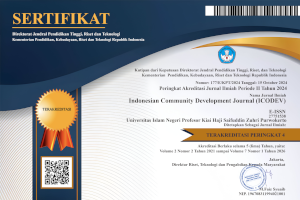Peran Diplomasi Siber Indonesia dalam Melindungi Keamanan Teknologi E-Commerce Nasional
الكلمات المفتاحية:
E-Commerce، Diplomasi Siber، Keamanan Siber، Ancaman Digitalالملخص
Tulisan ini mengkaji peran diplomasi siber Indonesia dalam melindungi keamanan teknologie-commerce nasional di tengah tantangan ancaman siber lintas batas. Dengan menggunakanmetode kualitatif dan pendekatan teori jaringan aktor, penelitian ini menyoroti urgensidiplomasi siber sebagai instrumen strategis untuk mengatasi kerentanan sektor terhadapserangan siber. Pesatnya pertumbuhan ekonomi digital di Indonesia diiringi oleh peningkatanancaman seperti pencurian data, serangan e-commerce malware, dan disinformasi, yangmenuntut kolaborasi multistakeholder dan kerangka regulasi yang kuat. Artikel ini menekankanpentingnya pendekatan multidisipliner dan kerjasama internasional melalui diplomasi siberuntuk memperkuat keamanan siber nasional. Diplomasi siber tidak hanya mencakup aspekteknis, tetapi juga pembentukan norma internasional, perlindungan data, dan peningkatankapasitas sumber daya manusia. Studi ini juga mengidentifikasi tantangan seperti rendahnyaliterasi digital masyarakat dan ketidaksiapan regulasi, serta menawarkan rekomendasi untukmemperkuat kerjasama bilateral dan multilateral.المراجع
Abebe, D. (2016). Cyberwar, international politics, and institutional design. U. Chi. L. Rev., 83, 1.
Alam, S. (2016). Penggunaan Teknologi Informasi dalam Diplomasi Modern Departemen Luar Negeri RI. Jurnal International & Diplomacy Universitas Satya Negara Indonesia, 2(1), 133-144.
Andress, J., & Winterfeld, S. (2012). The Basics of Cyber Warfare: Understanding the Fundamentals of Cyber Warfare in Theory and Practice. Newnes.
Ardika, I. W. C. (2025). Tinjauan Hukum terhadap Perlindungan Data Pribadi di Era Digital: Kasus Kebocoran Data Pengguna Layanan E-Commerce. Indonesian Journal of Law and Justice, 2(3), 11-11.
Ardipandanto, A., & Budiman, A. (2018). Dinamika Pelaksanaan Urusan di Bidang Persandian Pemerintah Daerah. Yayasan Pustaka Obor Indonesia.
Barrinha, A., & Renard, T. (2017). Cyber-diplomacy: the making of an international society in the digital age. Global Affairs, 3(4-5), 353-364.
Barston, RP (2014). Diplomasi Modern. New York: Routledge.
Beauchamp, Z. (2014). The Sony hack isn’t cyberwar and the US can’t really punish North Korea for it. Vox.
Bendovschi, A. (2015). Cyber attacks trends, patterns and security countermeasures. Procedia Economics and Finance, 28, 24-31.
Chotimah, H. C. (2019). Tata Kelola Keamanan Siber dan Diplomasi Siber Indonesia di Bawah Kelembagaan Badan Siber dan Sandi Negara [Cyber Security Governance and Indonesian Cyber Diplomacy by National Cyber and Encryption Agency]. Jurnal Politica Dinamika Masalah Politik Dalam Negeri dan Hubungan Internasional, 10(2), 113-128.
Deibert, R. J. (2002). Circuits of power: Security in the internet environment. Information technologies and global politics: The changing scope of power and governance, 117.
Dewi, D. K., & Sriyanto, D. (2024). Aspek Hukum dalam Pengaturan Ekonomi Digital: Tantangan dan Peluang di Indonesia. All Fields of Science Journal Liaison Academia and Sosiety, 4(2), 73-79.
Dunleavy, P., Margetts, H., Bastow, S., & Tinkler, J. (2006). New public management is dead—long live digital-era governance. Journal of public administration research and theory, 16(3), 467-494.
Edition, F. D. (2013). The global competitiveness report 2013–2014.
Hansen, L., & Nissenbaum, H. (2009). Digital disaster, cyber security, and the Copenhagen School. International studies quarterly, 53(4), 1155-1175.
Harman, B. M. (2020). Evaluating the Impact of Humor Training on Trust Climates within Intact Workgroups (Doctoral dissertation, Pepperdine University).
Haryono, N. (2024). Perlindungan Hukum bagi Konsumen dalam Transaksi E-Commerce Berdasarkan Hukum Ekonomi Syariah di Indonesia. Jurnal ISO: Jurnal Ilmu Sosial, Politik dan Humaniora, 4(2).
Hasan, Akbar. (2018). Jaringan Komunikasi Diplomatik Uni Eropa dan PBB Diretas, Informasi Bocor? https://www.liputan6.com/global/read/3852634/jaringan-komunikasi-diplomatik-uni-eropa-dan-pbb-diretas-informasi-bocor
Hathaway, O. A., Crootof, R., Levitz, P., & Nix, H. (2012). The law of cyber-attack. Calif. L. Rev., 100, 817.
Lacy, M., & Prince, D. (2018). Securitization and the global politics of cybersecurity. In Securitisation in the Non-West (pp. 100-115). Routledge.
Lee, J., & Moon, M. J. (2020). E-government and digital governance. In Routledge Handbook of Korean Politics and Public Administration (pp. 328-344). Routledge.
Louis, A., De Waal, A., & Venter, C. (2006). Named entity recognition in a South African context. In Proceedings of the 2006 annual research conference of the South African institute of computer scientists and information technologists on IT research in developing countries (pp. 170-179).
McCarthy, D. R. (2017). Introduction: Technology in world politics. In Technology and world politics (pp. 1-21). Routledge.
Nityasari, A. (2020). Technology Disruptions in International Relations: The Needs for Cyber Diplomacy by Indonesia. Global South Review, 2(1), 36-50.
Paterson, T. (2019). Indonesian cyberspace expansion: a double-edged sword. Journal of Cyber Policy, 4(2), 216-234.
Piliang, Y. E. S. (2012). Information and digital society: Information technology and social change. Journal of Sociotechnology, 27(11), 143-156.
Pratiwi, F. I., Hennida, C., Soesilowati, S., Berliantin, N., Ekasari, D. Y., Dewi, C. S., & Intan, A. A. (2024). Cybersecurity Challenges in Indonesia: Threat and Responses Analysis. Perspectives on Global Development and Technology, 22(3-4), 239-264.
Primawanti, H., & Pangestu, S. (2020). Diplomasi Siber Indonesia Dalam Meningkatkan Keamanan Siber Melalui Association Of South East Asian Nation (Asean) Regional Forum. Global Mind, 2(2), 1-15.
Republik Indonesia. Kementrian Luar Negeri. 10 Januari 2017. Negeri Republik Indonesia Retno L. P. Marsudi Tahun 2017.” (2017). http://kemlu.go.id/id/pidato/menlu/Documents/PPTM-2017-ID.pdf.
Riordan, S., 2016. Cyber diplomacy vs. digital diplomacy: a terminological distinction. USC CPD Blog. http://uscpublicdiplomacy.org/blog/cyber-diplomacy-vs-digital-diplomacy-terminological-distinction
Satriawan, I., Elven, T. M. A., & Lailam, T. (2023). Internet shutdown in Indonesia: An appropriate response or a threat to human rights. Sriwijaya Law Review, 7(1), 19-46.
Shakarian, P., Shakarian, J., & Ruef, A. (2013). Introduction to cyber-warfare: A multidisciplinary approach. Newnes.
Singer, P. W., & Friedman, A. (2014). Cybersecurity: What everyone needs to know. oup usa.
Sparrow, R. (2007). Killer robots. Journal of applied philosophy, 24(1), 62-77.
Tiirmaa-Klaar, H. (2013). Cyber diplomacy: Agenda, challenges and mission. Peacetime Regime for State Activities in Cyberspace, 509-531.
Valentina, A. L. B. E. R. T. I., Maria, A. R., Carmelo, A. T. T. A. R. D. O., Davide, A. U. T. E. R. I., Ricardo, R. B., Filipe, B. E. S., ... & Grazia, Z. U. L. I. A. N. (2019). The Future of Cities: Opportunities, challenges and the way forward. JRC Research Reports, (JRC116711).
التنزيلات
منشور
كيفية الاقتباس
إصدار
القسم
الرخصة
الحقوق الفكرية (c) 2025 Fany Anggun Abadi, Rifqi Itsnaini Yusuf, Intan Tiara Kartika

هذا العمل مرخص بموجب Creative Commons Attribution-ShareAlike 4.0 International License.







